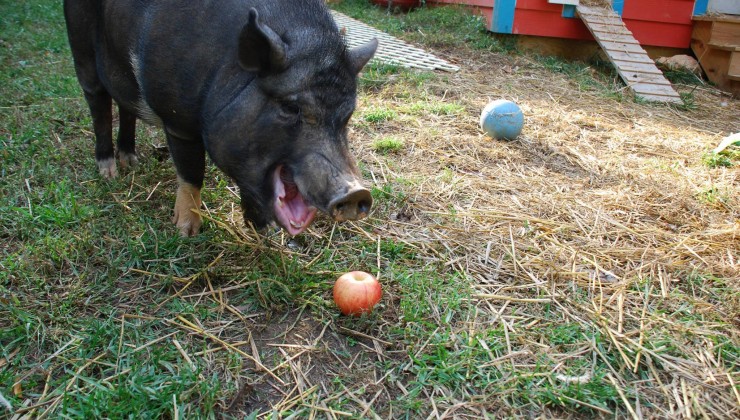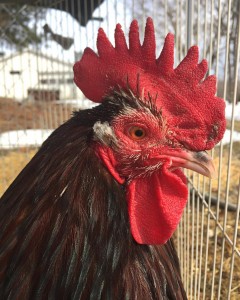
Microsanctuary Movement Seed Grants for farmed animal care
Almost two years ago, we found out about the work of Justin and Rosemary Van Kleeck, who were building a new approach to farmed animal rescue and care. We were so impressed by their philosophy, and so determined to help them spread it to a bigger audience, we gave them a grant for animal activism through our partnership with the kind people at The Pollination Project.
With this grant, the Van Kleecks were able to develop an excellent website as a resource for people everywhere engaged in this form of advocacy and animal care. At the online home of the Microsanctuary Movement, there are guides for taking caring of different species, a listing of trustworthy veterinarians that treat farmed animals, and advice on supporting and sustaining a microsanctuary.
Now, there’s something more they’re offering individuals with personal or nonprofit microsanctuaries: cash money.

Rocky, who is extremely handsome, lives at Cherry Run Roost Microsanctuary in WV. (http://cherryrunroost.weebly.com)
The Microsanctuary Movement has been given a generous (and anonymous) donation to nurture and spread even more good. In collaboration with A Well-Fed World, they have created their own seed grant program to support microsanctuaries with general expenses and also a Hen Reproductive Healthcare Fund for the specific veterinary needs of hens formerly exploited for eggs. (The unnaturally high egg production of chickens used in the egg industry frequently leads to osteoporosis and broken bones, but also uterine prolapse, peritonitis, eggs stuck in their reproductive tracts, and other painful, often deadly conditions.)
Individuals can get a $500 grant, and nonprofits can get $1000. Grant recipients will also get consulting and guidance from other microsanctuary experts.
Working with The Pollination Project, one of the things I learned about donating is the importance of timing.
“For most social change ventures, a donation of $1,000 or less doesn’t go very far unless it is exceptionally well timed,” TPP executive director Alissa Hauser wrote in Philanthopy Journal. “A timely micro-grant provides momentum for a project to raise more money and gain more exposure.”
At the wrong time, a thousand dollars doesn’t help much. At the right time, it helps enormously, especially when it represents the difference between moving forward with a project – or not. TPP has multiple examples of how small grants given at the right time have helped their grantees gain even more financial support and validation for their grassroots activism.
I’m going to brag that this is true of The Microsanctuary Movement too. That initial grant helped put a web infrastructure in place, and helped create a centralized hub for people engaged in this form of animal rescue and advocacy. Now, with this new donation funding these seed grants, Microsanctuary Movement is ‘paying it forward’ to other individuals and nonprofit microsanctuaries. And with these microsanctuary micro-grants, perhaps the next wave of vegans caring for farmed animals in their own homes can also attract more support for the life-saving work they’re doing.
To apply for a seed grant for your farmed animal rescue and care efforts, go here.
Featured image: Mott, who enjoys apples, is a resident of Triangle Chance for All in NC, where the Microsanctuary Movement began (http://trianglechanceforall.org).
Comments
Leave a Reply
*
ModVegan
May 5, 2016
What a fantastic idea! I can see how these grants would be hugely helpful for anyone running a small sanctuary.
animals that have
June 23, 2016
New Forest Wildlife Park | Ashurst, Southampton
Nzegge Valery Epie
June 15, 2019
Very timely initiative in the protection of farmed animals. Does this program provide support for endangered species like gorillas?
Kezia Jauron
June 15, 2019
No, this program is for farmed animal care.